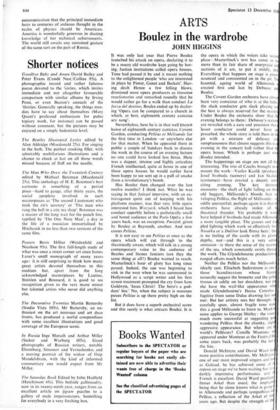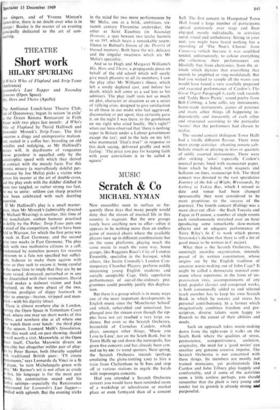ARTS Boulez in the wardrobe
JOHN HIGGINS
It was only last year that Pierre Boulez launched his attack on opera, declaring it to be a musty old wardrobe kept going by bor- ing, fustian institutions called opera houses. Time had passed it by and it meant nothing to the enlightened people 'who are interested in plays by Pinter, Genet and Beckett'. Hav- ing dealt Henze a few felling blows, dismissed most opera producers as tiresome reactionaries and remarked roundly that he would rather go for a walk than conduct La forza del destino, Boulez ended up by declar- ing 'Opera can be compared to a church in which, at best, eighteenth century cantatas are sung'.
Nevertheless, here he is in that well khoyiti home of eighteenth century cantatas, Covent Garden, conducting Pelleas et Melisande for the first time in London—or anywhere else for that matter. When he appeared there in public a couple of Sundays back to discuss the work in the course of an evening lecture no one could have looked less fierce. Here was a dapper, intense and highly articulate French intellectual, quite at home in one of those opera houses he would earlier have been happy to see sent up in a puff of smoke from a revolutionary's bomb.
Has Boulez then changed over the last twelve months? I think not. What he was saying in that Spiegel interview, with an ex- travagance quite out of keeping with his platform manner, was that very little opera interested him. Wozzeck, which I heard him conduct superbly before a pathetically small and bored audience at the Paris Opera a few years back, was an exception. Parsif al, given by Boulez at Bayreuth, another. And now comes Pelleas.
It is not easy to see Pelleas at once as the opera which will cut through to the theatrically aware, which will talk in a strong contemporary voice to the audience of Beatles and Stones fanciers (are they the same thing at all?) Boulez wanted to reach. Maeterlinck's hour of glory has long since passed. Indeed, the sun was beginning to sink in the west when he was summoned to Hollywood as a script writer and his first screen treatment prompted the cry from Sam Goldwyn, 'Jesus Christ! The hero's a god- dam' bee.' No, when the subject is museum pieces Pelleas is up there pretty high on the list.
But it does have a superb orchestral score and this surely is what attracts Boulez. It is
the opera in which the voices take secon, place—Maeterlinck's text has come in 10 more than its fair share df overpraise -a sections of it are, to put it mildly, dul Everything that happens on stage is prean nounced and commented on in the pit. T haunted, ageing world of Allemonde created first and last by Debussy a Boulez.
The Covent Garden orchestra have alwa been very conscious of who is at the helm the slack conductor gets slack playing a the best is always reserved .for the master Under Boulez the orchestra show that t. evening belongs to them : Debussy's textur are revealed with a care and precision that 'lesser conductor could never have a proached, the whole story is told there in t pit with a mixture of delicacy an sumptuousness that almost suggests this is a evening in the concert hall rather than opera house. Which is perhaps just (Boulez intended.
The happenings on stage are not all th interesting. The trio of Czechs brought in .mount the work—Vaclav Kaslik (producer Josef Svoboda (scenery) and Jan Skalick (costumes)—have created a decent, une citing evening. The key dramat moments—the shaft of light falling on thr• old beggars, Melisande's blonde hair e veloping Pelleas, the flight of Melisande—a oddly uneventful; perhaps again it is that t orchestra have already stolen all I theatrical thunder. Yet probably it won have helped if Svoboda had made Allemon a more tangible place. The gauzes and da ,pled lighting which work so effectively for Rusalka or a Dalibor look flimsy here: the is no feeling of the castle with its gloo depths, nor—and this is a very serio omission—is there the sense of the neam of the sea, which constantly swirls throw the work. The Glyndebourne production a . ranged affairs much better.
Neither the Pelleas nor the Melisande ideally cast. Elisabeth Soderstrom is one those Scandinavians whose feat u naturally suggest the brunette and the gold tresses sit oddly on her shoulders; nor d, she have the waif-like appearance whi. made Glyndebotirne's Ileana Cotrubas fugitive from some Dulac drawing last su mer. But her artistry sees her through : t carefully spun, almost fragile tone mak this a good Melisande to listen to. Much same applies to George Shirley: the voice _much more successful at suggesting Po, wandering Pelleas than the chunky, slight aggressive. appearance. But where are world's Pelleases? Camille Maurane. appeared under Monteux at the Festival H• some years back, was probably the last the line.
Donald McIntyre and David Ward ma more positive contributions. Mr McIntyre one of our most improved singers and n as Goland, he has achieved some of repose on stage we've been waiting for: it is darkly impressive performance and French is excellent. David Ward produces firmer Arkel than usual, the implica being that he alone knows what is going in Allemonde and perhaps sympathises Pelleas, a reflection of the Arkel of years ago. But despite the strength of two singers, and of Yvonne Minton's Genevieve, there is no doubt over who is in charge: Boulez is the master of an evening principally dedicated to the art of con- ducting.















































 Previous page
Previous page